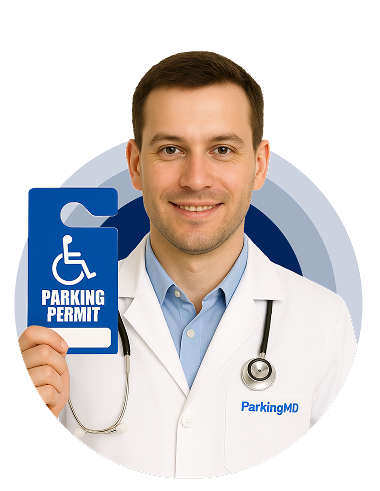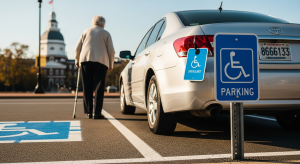Fast, easy, and affordable
Get Your Georgia
Handicap Parking Permit Online Today




Our physicians will review your medical records to verify your qualifying condition.
Uploading relevant documentation early helps ensure a fast review. Don’t have your records?
No problem—we can help you get them from your doctor.
Our physicians will review your medical records to verify your qualifying condition. Uploading relevant documentation early helps ensure a fast review. Don’t have your records? No problem—we can help you get them from your doctor.

See What Our Happy Customers Are Saying!

Book Your Appointment
Skip the wait at the doctor’s office and schedule your DMV disability parking permit evaluation from the comfort and convenience of your home.

Match With
A Licensed Doctor
Connect with the right doctor in minutes and easily chat with your provider on a smartphone, computer, or tablet via phone call or video.

Get Approved And Receive Your Certification Form (MV-9D)
Once your evaluation is complete and approved, you’ll receive a medical certification form (MV-9D) signed by our licensed doctors.



Disability Parking in Georgia:
Everything You Need to Know
Georgia Disability Parking Laws
- Qualifying conditions include: hearing impairment; disabilities expected to incapacitate for more than 180 days; inability to walk 200 feet without stopping; use of assistive device; lung disease; use of portable oxygen; cardiac condition classified as Class III or Class IV; vision impairment; or severe limitation in walking due to arthritic, neurological, or orthopedic condition.
- A licensed doctor of medicine, osteopathic medicine, podiatrist, optometrist, or chiropractor must certify your condition on Form MV-9D.
- Permanent placards (blue) are valid for 4 years.
- Temporary placards (red) are valid for up to 180 days and cannot be extended. If additional time is needed, a new application must be completed.
- Special equipment placards (gold) are valid for 4 years for persons who drive vehicles with hand controls or are disabled from loss of both upper extremities.
- Parking violations result in fines of $100 to $500. Fraudulent use is a misdemeanor. Vehicles may be towed.
- The placard must be displayed on the driver's side dashboard or hung from the rearview mirror when parked. Remove when driving.
- Each eligible individual will be issued only one placard.
- Applications must be submitted to your local County Tag Office.
Documents You’ll Need
To apply for, replace, or renew a Georgia disability parking placard, the required documents vary slightly depending on your situation. Here's a breakdown:
New Permanent, Temporary, or Special Equipment Placard
To apply for a new disability parking placard in Georgia, you'll need:
- Form MV-9D (Disabled Person's Parking Affidavit), completed and signed by a licensed doctor
- Section D must be notarized, OR healthcare provider may submit a signed statement on security paper (as defined by GA Code 26-4-5) that includes the specific disability, indication of permanent or temporary status, provider stamp or signature, and date
- A copy of your Georgia driver's license or ID card
- You do not need to own a vehicle to obtain a placard
Online Doctor's Certification
If applying through a telehealth service like ParkingMD, you can get your evaluation done completely online. You'll receive:
- A signed medical certification (Form MV-9D or security paper statement) delivered to you via email within 24-48 hours, ready for County Tag Office submission
Lost or Stolen Placard Replacement
If your placard is lost or stolen, you'll need to provide:
- Form MV-9D (Sections A, B, and F only)
- List your previous placard number
- A copy of your Georgia driver's license or ID card
- No medical certification or notarization required
Note:
The handicap placard can be moved to any vehicle in which the person with the disability is traveling.
Permanent Placards
- Expire every 4 years and must be replaced.
- Renewal requires Form MV-9D (Sections A, B, and F only).
- No medical certification or notarization required for renewals.
Temporary Placards
- Valid for up to 180 days and cannot be extended for additional time.
- If additional time is needed, a new application with medical certification must be completed.
Special Equipment Placards
- Valid for 4 years and must be replaced every four years.
- Issued only to individuals who drive vehicles equipped with hand controls or are disabled from loss of both upper extremities.
Replacing a Lost, Stolen, or Damaged Placard
- Complete Form MV-9D (Sections A, B, and F only).
- List your previous placard number.
- Provide a copy of your Georgia driver's license or ID card.
- No medical certification or notarization required.
Turnaround Time
Contact your local County Tag Office for specific processing times. Most applications are processed during your visit when submitted in person.
Georgia Disability Parking Laws
- Qualifying conditions include: hearing impairment; disabilities expected to incapacitate for more than 180 days; inability to walk 200 feet without stopping; use of assistive device; lung disease; use of portable oxygen; cardiac condition classified as Class III or Class IV; vision impairment; or severe limitation in walking due to arthritic, neurological, or orthopedic condition.
- A licensed doctor of medicine, osteopathic medicine, podiatrist, optometrist, or chiropractor must certify your condition on Form MV-9D.
- Permanent placards (blue) are valid for 4 years.
- Temporary placards (red) are valid for up to 180 days and cannot be extended. If additional time is needed, a new application must be completed.
- Special equipment placards (gold) are valid for 4 years for persons who drive vehicles with hand controls or are disabled from loss of both upper extremities.
- Parking violations result in fines of $100 to $500. Fraudulent use is a misdemeanor. Vehicles may be towed.
- The placard must be displayed on the driver’s side dashboard or hung from the rearview mirror when parked. Remove when driving.
- Each eligible individual will be issued only one placard.
- Applications must be submitted to your local County Tag Office.

Documents You’ll Need
To apply for, replace, or renew a Georgia disability parking placard, the required documents vary slightly depending on your situation. Here’s a breakdown:
New Permanent, Temporary, or Special Equipment Placard
To apply for a new disability parking placard in Georgia, you’ll need:
- Form MV-9D (Disabled Person’s Parking Affidavit), completed and signed by a licensed doctor
- Section D must be notarized, OR healthcare provider may submit a signed statement on security paper (as defined by GA Code 26-4-5) that includes the specific disability, indication of permanent or temporary status, provider stamp or signature, and date
- A copy of your Georgia driver’s license or ID card
- You do not need to own a vehicle to obtain a placard
Online Doctor’s Certification
If applying through a telehealth service like ParkingMD, you can get your evaluation done completely online. You’ll receive:
- A signed medical certification (Form MV-9D or security paper statement) delivered to you via email within 24-48 hours, ready for County Tag Office submission
Lost or Stolen Placard Replacement
If your placard is lost or stolen, you’ll need to provide:
- Form MV-9D (Sections A, B, and F only)
- List your previous placard number
- A copy of your Georgia driver’s license or ID card
- No medical certification or notarization required
Note:
The handicap placard can be moved to any vehicle in which the person with the disability is traveling.

Permanent Placards
- Expire every 4 years and must be replaced.
- Renewal requires Form MV-9D (Sections A, B, and F only).
- No medical certification or notarization required for renewals.
Temporary Placards
- Valid for up to 180 days and cannot be extended for additional time.
- If additional time is needed, a new application with medical certification must be completed.
Special Equipment Placards
- Valid for 4 years and must be replaced every four years.
- Issued only to individuals who drive vehicles equipped with hand controls or are disabled from loss of both upper extremities.
Replacing a Lost, Stolen, or Damaged Placard
- Complete Form MV-9D (Sections A, B, and F only).
- List your previous placard number.
- Provide a copy of your Georgia driver’s license or ID card.
- No medical certification or notarization required.
Turnaround Time
Contact your local County Tag Office for specific processing times. Most applications are processed during your visit when submitted in person.

Benefits of Having a Handicap Placard

Driver’s License Exemption for In-Person Submission

Extended Time Limits


Convenience and Safety

No Meter Payment in Some Cities
FAQs

How do I apply for a disability parking permit online in Georgia?
To apply through an online service like ParkingMD, start by completing a quick evaluation with a licensed healthcare provider from the comfort of your home. If you're approved, your signed medical certification (Form MV-9D or security paper statement) will be delivered to you via email within 24-48 hours. Once you receive the form, submit it along with a copy of your Georgia driver's license or ID card to your local County Tag Office to receive your disability parking placard.
Is a Georgia handicap placard valid in other states?
Yes, Georgia disability placards are recognized in all other U.S. states. You can use your Georgia placard to access accessible parking spaces when traveling throughout the country. Just make sure your placard is clearly displayed and up-to-date, and follow the disability parking regulations of the state you're visiting, as rules may vary by location.
What are the parking rules and regulations for disability placards in Georgia?
Your Georgia disability placard must be displayed on the driver's side dashboard or hung from the rearview mirror when parked, and removed when driving. The placard is only valid when the person with the disability is present in the vehicle as either the driver or passenger. It's illegal to allow someone else to use your placard when you're not present, violations result in fines of $100 to $500, and vehicles may be towed. The placard does not allow parking where parking is prohibited.
Explore Georgia Hotspots
With Your Accessible Parking Permit

Atlanta






































































